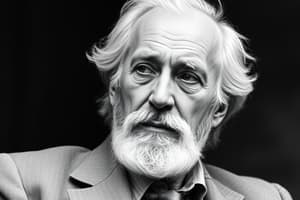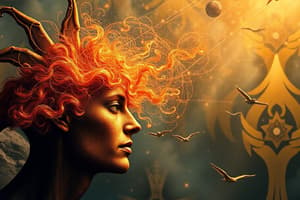Podcast
Questions and Answers
What are the two main attitude types proposed by Jung?
What are the two main attitude types proposed by Jung?
- Extraversion and Introversion (correct)
- Rationality and Emotion
- Intuition and Sensation
- Thinking and Feeling
How many outstanding psychological types does Jung identify?
How many outstanding psychological types does Jung identify?
- 8 (correct)
- 4
- 10
- 6
Which psychological function is characterized as rational by Jung?
Which psychological function is characterized as rational by Jung?
- Feeling (correct)
- Sensation
- Sensation
- Intuition
What motivates Jung's exploration of personality types?
What motivates Jung's exploration of personality types?
What does Jung argue about the theories of Freud and Adler?
What does Jung argue about the theories of Freud and Adler?
What is the nature of the fantasies described by Jung in the context of Adlerian and Freudian patients?
What is the nature of the fantasies described by Jung in the context of Adlerian and Freudian patients?
What characterizes the dominant function in Jung's theory?
What characterizes the dominant function in Jung's theory?
What was one of Jung's main insights regarding the resolution of differences between psychological theories?
What was one of Jung's main insights regarding the resolution of differences between psychological theories?
What characterizes the unconscious of a thinking type?
What characterizes the unconscious of a thinking type?
Which psychological type is described as judging experiences simply as they happen?
Which psychological type is described as judging experiences simply as they happen?
What can occur in an extraverted feeling type if subjective judging is repressed?
What can occur in an extraverted feeling type if subjective judging is repressed?
What outcome results from repression of objective judging in an introverted rational type?
What outcome results from repression of objective judging in an introverted rational type?
Which combination of types contains the potential for compulsive pleasure-seeking behavior?
Which combination of types contains the potential for compulsive pleasure-seeking behavior?
What psychological function transmits physiological stimuli to conscious perception?
What psychological function transmits physiological stimuli to conscious perception?
How does repression affect the introverted sensation type?
How does repression affect the introverted sensation type?
In what state do the functions of the unconscious exist?
In what state do the functions of the unconscious exist?
What influences the surface of negative ideas in an extraverted thinking type?
What influences the surface of negative ideas in an extraverted thinking type?
Which psychological type judges according to rationality and objective facts?
Which psychological type judges according to rationality and objective facts?
What is the primary focus of the introverted feeling type?
What is the primary focus of the introverted feeling type?
What aspect characterizes extraverted intuitive types when under stress?
What aspect characterizes extraverted intuitive types when under stress?
Which psychological type operates primarily on internal principles?
Which psychological type operates primarily on internal principles?
What defines the extraverted sensation type's guiding principle?
What defines the extraverted sensation type's guiding principle?
Flashcards are hidden until you start studying
Study Notes
Carl Jung's Psychological Types
- Jung sought to synthesize the theories of Freud and Adler, concluding his own perspective was distinct.
- He proposed four main conscious functions: Sensation, Intuition, Thinking, and Feeling.
- Sensation receives physiological stimulus, while Intuition transmits mental associations.
- Thinking utilizes logical concepts, while Feeling makes subjective value judgments.
- Jung identified two main attitude types: Extraversion and Introversion.
- Extraversion focuses on the objective environment.
- Introversion focuses on the subjective psyche.
- Jung believed each individual's conscious state is characterized by a dominant function and attitude, while its opposite is repressed in the unconscious.
- Psychological Types are eight combinations of function and attitude:
- Extraverted Sensation / Introverted Sensation
- Extraverted Intuition / Introverted Intuition
- Extraverted Thinking / Introverted Thinking
- Extraverted Feeling / Introverted Feeling
- Extraverted Rational Types judge according to societal standards of rationality, suppressing subjective perception and reason.
- Examples include compulsive pleasure-seeking (repressed sensation) or suspicion of evil (repressed intuition).
- Extraverted Irrational Types are guided by present events and experience, suppressing subjective judgment.
- Examples include calculating behavior (repressed thinking) or ruthlessness (repressed feeling).
- Introverted Rational Types judge according to their own internal principles, suppressing objective judgment.
- Examples include inflexibility and egotism (repressed objective judgment).
- Introverted Irrational Types are guided by their subjective inner world, suppressing objective perception.
- Examples include delusion and loss of touch with reality (repressed objective perception).
- Secondary Functions can influence the dominant function, adding complexity to the types.
- A thinking type might have a well-developed feeling function that influences their perspective.
- Jung believed primitive peoples have a more uniform awareness of all four functions.
Studying That Suits You
Use AI to generate personalized quizzes and flashcards to suit your learning preferences.




